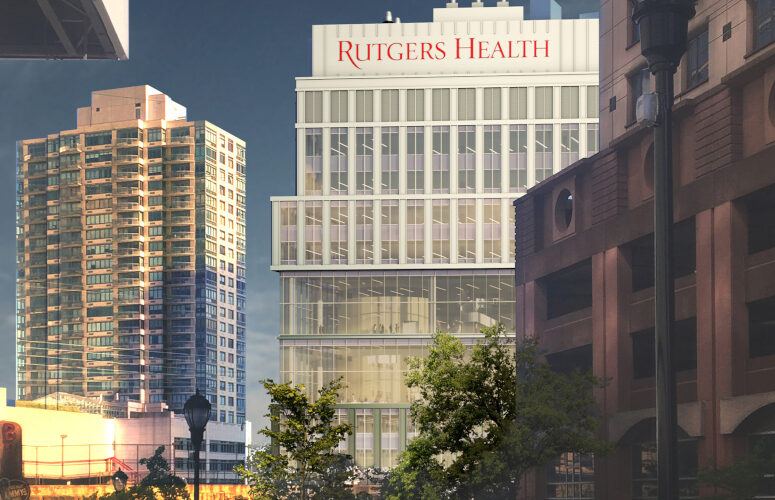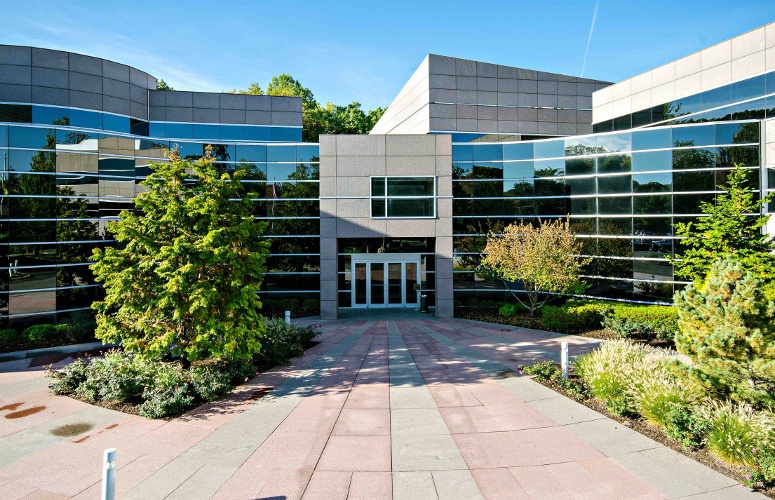
Rutgers Health at the HELIX Approved by University Board
State-of-the-art medical school, translational research facility to be completed by 2026
On Mar 22, 2023Construction will begin this spring on the first of three buildings in the New Jersey Health + Life Science Exchange (HELIX), a public-private development planned in downtown New Brunswick, following approval yesterday by the Rutgers University Board of Trustees.
Rutgers Health at the HELIX will be the new home to Rutgers Robert Wood Johnson Medical School and a Rutgers translational research facility equipped with a variety of labs to advance the work of 80 research teams and put into practice health innovations that will improve individuals’ and public health.
The trustees’ consent followed the Rutgers Board of Governors’ Feb. 27 approval of a tentative funding plan for Rutgers’ portion of the HELIX.
The HELIX, which will be developed by the New Brunswick Development Corporation on a site across from the New Brunswick train station, is designed as an innovation center providing businesses, universities and researchers critical space to work, learn, experiment and collaborate. State-of-the art laboratories, offices, work and learning spaces will come together in the first, 12-story building to foster research, treatment and business breakthroughs.
“Rutgers Health at the HELIX will transform and affirm to the world the core value of Rutgers’ research and medical education enterprise,” President Jonathan Holloway said. “Imagine: We will be educating new generations of medical students alongside cutting-edge laboratories and researchers – in the same space where we collaborate with our colleagues at Princeton and businesses, including the two largest hospital systems in the state. It will be an epicenter of health innovation.”
The Rutgers boards approved the funding plan for Rutgers’ portion of the project, which includes one-time state funds and tax credits. Planning for the public-private complex began several years ago when New Jersey Governor Phil Murphy first proposed in 2017 a hub to invigorate the state’s innovation economy.
Since then, the pandemic reinforced the need for continued groundbreaking health and medical research while a Rutgers Biomedical and Health Sciences master plan set a new standard for excellence in health sciences education, research and patient care, said Antonio Calcado, executive vice president and chief operating officer.
“We have arrived at a place that not only will bring the New Jersey innovation hub to fruition, but we will also significantly improve Rutgers’ standing in the delivery of medical education while transforming what translational research looks like,” Calcado said. Translational research, often referred to as bench-to-bedside research, turns laboratory discoveries into new ways to improve health care and medical treatment.
The estimated cost of the first HELIX building is $732 million with the Rutgers portion estimated to be $567 million. The Rutgers’ portion of the project will be paid largely through $200 million of federal American Rescue Plan funds provided by the state and approximately $190 million in tax credits administered through the New Jersey Economic Development Authority Aspire program. Rutgers will finance the remaining $180 million of the cost through tax-exempt and taxable bonds.
Rutgers Health at the HELIX also will have a significant operational and economic impact within the city of New Brunswick, free existing Rutgers space for academic, clinical, and research expansion and bolster Rutgers’ role as a research and economic innovation leader in the region, Calcado added.
The three-year construction project will support more than 7,000 jobs and generate about $83 million in local, county and state tax revenues. Once completed, the HELIX is projected to produce approximately $880 million in economic activity annually in the state, including supporting about 4,500 jobs, according to an economic impact report on the project.
“With the boards’ approval, we will begin to bring together higher education institutions, health systems and the life sciences industry to revolutionize clinical and translational research – turning our groundbreaking research into care and cures,” said Rutgers Biomedical and Health Sciences Chancellor Brian Strom.
“Moving the Robert Wood Johnson Medical School into one state-of-the-art campus will improve medical students’ experience through holistic medical education and opportunities for clinical experiences in all four years of medical school,” Strom added.
To access more business news, visit NJB News Now.
Related Articles:





